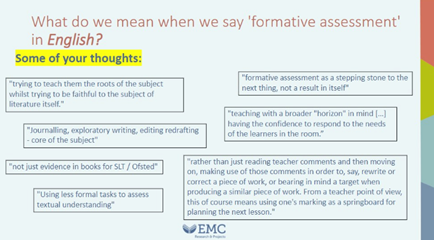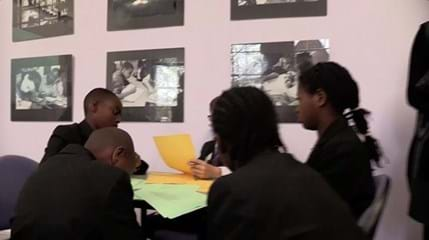A few weeks ago I went back to St Michael’s to talk to the teachers about their perceptions of the work we had done in the group work project – two lessons on poetry that I had set up followed by their own sequence of lessons on a wider range of poems. I had my own list of issues and questions to raise but was also very open to listening to what had been of most interest to them. The conversation ranged across all the big ‘themes’ that the project has been trying to address: everything from size and composition of groups, to level of challenge to the role of the teacher in imparting knowledge and directing the groups to the offer of choice to students and the difference this made to their pleasure in the work.
One of the most interesting areas of discussion – and a major concern for them – was the writing that the students did as a result of this unit with its strong focus on group work – and how this fitted into the school’s own requirement for regular formal assessments of students’ work, tied to a set of descriptors of pupil progress that is linked to GCSE. I’m sure that this is a live issue for many English departments, who are expected to measure student progress at regular intervals in relation to future attainment in external exams.
Richard Long, the Head of Department, had been doing lots of blogging with his students in the course of the group work activities. This was informal writing but it seemed to me that its informality didn’t mean that it wasn’t – at its very best – analytical, reflective and highly academic in its own way. Take this example from Shannon:
Hi sir, it’s Shannon here.
This is my opinion for ‘Women Work’.The poem is from Maya Angelou and she is American and I like it because she expresses all of the jobs that a women has to do and near to the end when it says ‘ let me rest tonight’ implies that she wants a rest from all the jobs that needs to be done and when it about all the jobs, it can create an impression of breathlessness when the reader reads it. The last parts of the poem give of a calm mood because it gives you an image of her feeling more calm and relaxed than when she was doing all the chores.
Hope you like my opinion on the poem that I have chose.
P.S Maya Angelou has had seven published autobiographies, three book essays and seven books of poetry. I also thought of a way to describe poetry, poetry is like a cake there are three layers of detail and the last layer is the topic. If you make your poetry really ‘tasty’, then the will feel engaged into poetry that will want to read more.
What might one notice about this writing? The genuine audience of her teacher and peers? The informality of her address to him and them? The clear signalling that what she’s going to offer is an honest opinion of her own? A sense that she has gone off to find out more about this poet and then suddenly, the joy and surprise of her throwing in something about what she understands poetry to be, that itself uses the figurative, metaphorical language of poetry. She’s saying something that even many A Level students find hard to grasp, that ‘topic’ or ‘content’ is just one part of poetry – if you try to reduce it to a single layer, you diminish it. Here’s Shannon really thinking for herself about the nature of poetry. Her understanding about poetry – aged 11 – is very impressive. But where’s the learning objective, or progress descriptor that could capture this? It’s so much simpler to ask whether she can infer or deduce, whether she can understand what a metaphor is, or identify assonance or a determiner and say yes or no, than to pin down this bigger, more conceptually complex understanding about how poetry differs from other forms. I find myself thinking, please don’t knock this kind of knowledge out of her by the time she reaches GCSE and A Level. Of course some might also mention the spelling mistakes and her predominant use of a sentence structure that proceeds largely through co-ordination rather than subordination. I would be concerned about this if she were not addressing these issue in other, more formal contexts as she develops, but here, in this blog, the focus is different. It’s exploratory writing and the hard task for an 11-year old of thinking through difficult ideas takes precedence for me. The focus on technical accuracy and writing style can be addressed in other ways, at other times.
Below is another rather more formal blog entry. We discussed this piece when I met the department and agreed that it was exceptionally good at getting to the heart of what’s important in this poem. This is something that, as co-editor of emagazine, I’m sometimes depressed to find missing in student submissions and in many entries for our poetry and close reading competitions. Far too many GCSE and A Level students seem to have lost the ability to make a concise and sharply focused statement about the whole text, in favour of more diffuse and ill-judged micro-analysis that misses the obvious. What’s great about Beatrix’s writing is its big picture thinking – its ability to grasp some of the key ideas behind the poem, and explore them with some subtlety. In fact, the only places where it seems to falter are where she suddenly seems to feel obliged to ‘prove’ her knowledge of technical literary terms and her mastery of academic language. Her sentence about the poet using ‘the determiner ‘my’ to indicate that the floor and window was hers’ and her awkward use of the term ‘enjambment’ are the least convincing elements in her account of the poem.
In the poem, ‘Children in Wartime’, Thrilling uses sibilance to give a calm mood however, it is set in a dark, ’moated’ place. The poem is in a child’s perspective during wartime. The narrator seems confused especially when she says,’ people said it was a storm, but flak had not the right sound for rain’ this implies that the child doesn’t believe the people. The ‘people’ sound like adults who were trying to persuade and comfort the children and trick them into thinking that there are not in danger. Although, the children are doubting it.
Thrilling uses onomatopoeia to describe the damage the thunder could not do –‘thunder left such huge craters of silence’. Those craters could be craters from a bomb however, even though the explosion of the bomb was loud what it left behind was silence. Yet the children were told it was just a, ‘giant playing bowls’
The narrator’s window gives a dreamy mood as it is, ‘spun with stars,’this is another use of sibilance. During wartime the window fell and the reflection of the sky ,’lay broken’ on her floor. This could be the reflection of the sky on the broken glass because the window represented her hopes and dreams ,the broken glass is a symbol of the child’s broken dreams and hopes. The poet uses the determiner, ‘my’ to indicate that the floor and window was hers.
The poem is enjambment and at a quick pace. This gives the poem a fast,pressured mood. The whole poem is in one stanza to show that there is no pause.
Beatrix
Even in the briefest of writing that took place during the group activity itself – the note-taking in the very first group work lesson, there was evidence that students were – individually – pulling out some key idea about the poems they’d chosen and in the discussions, were able to ‘think big’ in these ways. They weren’t getting bogged down too fast in the detail. The reading of several poems in the lesson, and the quick reading and discussion that ensued, may have meant that they didn’t always ‘get’ everything about the poems but this kind of reading was giving them the experience of reading fast, having a quick ‘gut reaction’, making overall judgements and thinking about what leapt out for them in terms of what they liked. The 11-year old student who read ‘This poem is dangerous’ and questioned whether it was really a poem or ‘more like a public health advert’ was fearless in getting to the heart of what makes that poem special, odd and different and even more stunningly perceptive in saying that perhaps the poet was right because poems really do get to your emotions! What might that student have written if they’d been given a formula for sentence openers, or told to make sure that they do PEE, or told that they must write about sound, imagery, form or anything else? Would this kind of perceptive, broader understanding emerge? That’s a question for us all to think about.
This particular unit was positioned in the Year 7 curriculum just before one of the school’s periodic, formal assessment points, which raised very interesting – and not always straightforward – issues. The teachers felt some degree of uncertainty about whether the formal assessment they’d devised – an essay on an unseen poem – would show the kind of progress they hoped for. In some cases, it really did! The work of some students showed real confidence and maturity. Oliver’s writing (below) also shows some clear footprints from the group work we did – the kind of open exploration we’d encouraged. He seems to have the confidence to explore ambiguity and wrestle with difficult ideas. He’s unafraid to express a degree of uncertainty and then try to resolve it. His use of quotation is not cold ‘after the fact’ evidence but part of an ongoing tussle with the meaning of the text:
At the beginning of stanza 4 Pastan confuses me when she says, ‘while you grew smaller, more breakable,’ but I read it over and over and noticed that she meant more breakable as in more delicate to the outside world and less protected from dangers. In stanza 4 Pastan also goes on saying ‘pumping, pumping for your life, screaming with laughter.’ This makes me think that the daughter has some doubts and doesn’t want to leave her mother.
In stanza 5 it is clear the girl is leaving when speaker says ‘the hair flapping behind you like a hankerchief waving goodbye.’ I know she is sad as hankerchiefs are somthing you could use to get rid of tears. This is a simile as her hair isn’t literally a hankercheif but is like a hankercheif. This end stanza also makes me think the daughter has left without saying goodbye. At this point the speaker sounds emty and feels like they have nothing left without the memorys that were shared with her daughter.
Some students’ formal assessments raised more problems. One student, James, had really taken to heart our message in the group work that it was fine to be uncertain about meanings in poetry. He wrote his whole formal assessment with a repeated refrain of how confused he was about the poem he chose to write about. My initial reaction was to feel quite worried, along with the teacher, about the clear weaknesses in his writing. He’d really not done very well at all in his assessment! But when I came to look at the writing in more detail and reflect on it, I became aware of just how much this piece of assessed writing had to tell us about what the student knew, or didn’t know. It was a brilliant insight into what needed to be done to move him on – to help him make progress in future. In particular, what emerged was his difficulty in reading beyond the literal, recognizing fully that poems often work in metaphorical ways. Just because a poem is about a girl riding a bicycle, it doesn’t mean that it can’t also really be about something else. The boy’s assessment gives a clear, transparent window onto his thinking and misunderstandings. And isn’t this what progress tests should be about? Rather than fretting about whether he has met a target for ‘achievement’ at this given moment, in this one test, and therefore what he might achieve at GCSE, shouldn’t we be using the test as a valuable tool to find out more, to allow us to respond in ways that ensure that progress is genuinely made? He has four and a half more years left to make the progress we’re looking for and this helps us achieve that. As it happens, the assessment descriptors for the formal assessment (use of subject terminology, evidence etc) don’t help much with sorting out what’s gone wrong for James. It’s much more to do with understanding how poems can work on different levels, both literally and figuratively.
There were other questions around the question of assessment. If blog style writing wasn’t acceptable (despite the fact it demonstrated so much about what the pupils had learned,) then what else would be? I put to the department that perhaps the mismatch between the formal assessment and the work on the unit was worth unpicking. First, was it necessary (and helpful) in Year 7 for the formal assessment to have such a direct relationship to a GCSE task many years down the line – an unseen critical commentary? Might it not be better to make the assessment match the learning more closely, for instance to give students two or three poems and ask them ‘Which of these poems would you advise your teacher to work on with next year’s Year 7s and why?’ This assessment would have involved formal writing, a close focus on a single poem (in relation to others) but might have been more closely allied to the work the students had been doing in the unit and the ‘big picture’ understandings they were developing about poetry. I wonder what James might have done with a task of this kind?
Second, I would come back to the question of whether or not there are some vitally important elements of textual study that need to be taught (and if possible assessed) that are missed if you’re assessing progress in relation to narrowly defined progress descriptors. The progress descriptors that the department have used since the scrapping of NC levels have been taken from a set of descriptors designed by Hertfordshire Grid for Learning for the new GCSE grades 1-9. ‘Having an overview of a whole text’ or ‘confidently making choices and justifying them’ or ‘understanding the multiple meanings and complexity of poetry as a form’ or ‘being able to sustain an interpretation and develop it, or ‘being able to talk about one poem in relation to others’ didn’t appear in these. However these broader skills and understandings do make the difference between high grade responses and lower ones at KS4 and beyond. There’s a danger that in only assessing what can apparently be easily assessed – e.g. can infer, can use quotation, can use subject terminology, these bigger picture elements are not only not assessed, but not valued and therefore not taught. Going back to Oliver’s piece, or that of Beatrix and Naomi-Lee, it is these bigger ideas that mark them out as being so exceptional. They don’t actually use masses of subject terminology. But does that matter? Great writing at KS4, KS5 and even in university English is highly judicious in its use of terms, only using them when appropriate rather than for the sake of show. If the mark scheme on the assessment says ‘Uses subject terminology effectively’ and the teacher marking says as justification for a high mark, ‘Lots of subject terminology mentioned’, then that’s the message students will be getting. Yet, as Beatrix’s blog and Oliver and Naomi-Lee’s assessment show, it’s not subject terminology that makes the writing so good but the genuinely reflective ideas about what’s ‘going on’ in the poem. Making your focus ‘using subject terminology’ might actually make your writing worse rather than better!
These are some thoughts emerging from the writing that came out of these lessons. They pose many questions, not least of all because of the pressure on English teachers to work within national and whole school assessment structures that don’t always seem to be either well-timed or fully integrated into learning. But these reflections also seem to answer a few questions, particularly in highlighting the ways in which exploratory talk and writing can offer something genuinely helpful and developmental, encouraging exactly the kind of thoughtful, genuine responses to texts that we’re ultimately hoping for. Our work also suggests that we may be getting KS3 progress assessment a bit wrong, if we tie it too closely to GCSE requirements and only see it as a measure of progress, a bit of data to worry or reassure us about a pupil’s position at a given moment, rather than viewing it as a window into what students are thinking and learning and what they (and we) need to do next.
We are immensely grateful to Richard Long and his department for collaborating with us so enthusiastically on this project.




